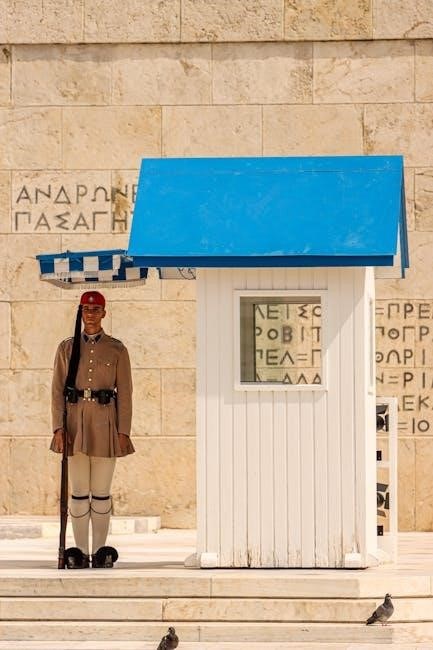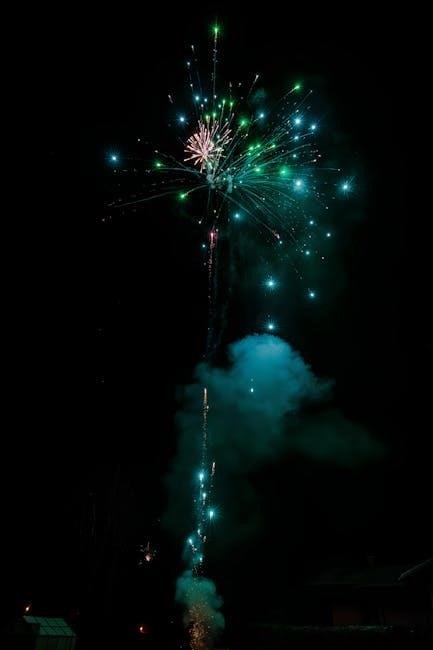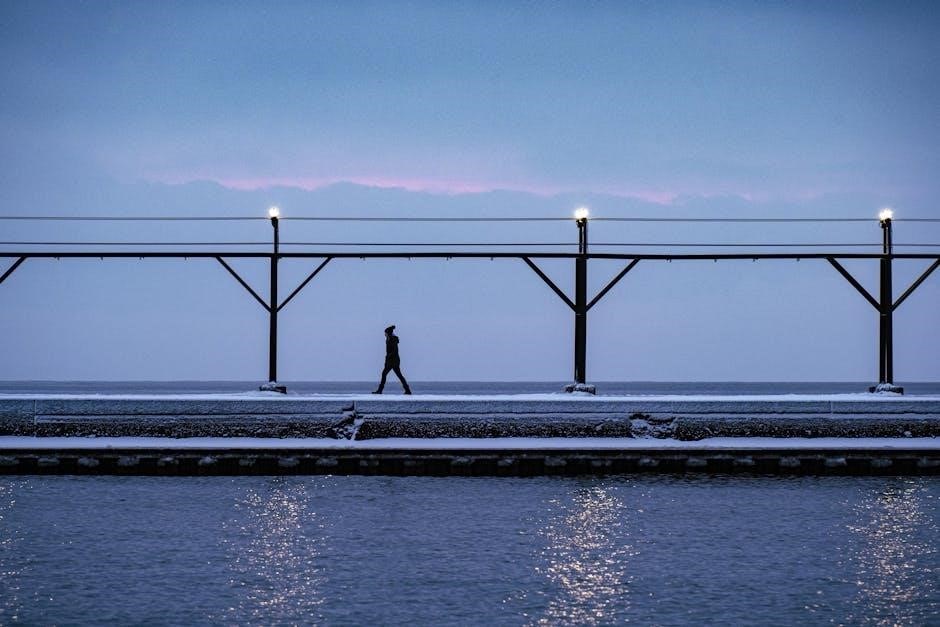
Michigan Fireworks Law 2024: A Comprehensive Guide

Understanding Michigan’s fireworks laws for 2024 is crucial for safe and legal celebrations. This guide provides essential information‚ covering key dates‚ permitted hours‚ and types of fireworks allowed. Stay informed about regulations‚ restrictions‚ and safety guidelines to ensure compliance with the Michigan law.
Michigan’s fireworks laws have undergone revisions‚ aiming to balance celebratory traditions with public safety and community well-being. The state law permits the use of consumer fireworks during specific dates and times‚ primarily around national holidays. However‚ local municipalities retain the authority to enact ordinances regulating the ignition‚ discharge‚ and use of consumer fireworks. This includes prescribing hours of the day or night when fireworks can be used.
It’s essential for Michigan residents to understand both state and local regulations regarding fireworks. State law dictates the overarching framework‚ allowing fireworks usage during certain periods. Local ordinances can impose further restrictions‚ tailoring regulations to the specific needs and concerns of individual communities. Ignorance of these regulations can lead to fines and penalties.
The Michigan Department of Natural Resources (DNR) also plays a role‚ particularly concerning fireworks usage in state parks‚ trails‚ and harbors. Aerial fireworks are generally prohibited in these areas‚ while smaller fireworks may be permitted. Staying informed about these specific regulations is crucial for responsible and lawful fireworks usage throughout Michigan.
Key Dates for Legal Fireworks Discharge in 2024
In Michigan‚ the legal discharge of consumer fireworks is permitted during specific dates surrounding national holidays. For 2024‚ these key dates primarily include the period leading up to and following the Fourth of July. Specifically‚ Michiganders can legally set off fireworks from June 29th through July 5th. This window allows for celebrations surrounding Independence Day‚ a time traditionally associated with fireworks displays.
Additionally‚ fireworks are permitted on other select holidays throughout the year‚ such as New Year’s Eve and Labor Day. It’s important to note that these dates are subject to state law and may be further restricted by local ordinances. Therefore‚ residents should always check with their local government for any specific regulations in their area before discharging fireworks.
The Michigan fireworks law aims to provide opportunities for celebration while also ensuring public safety and minimizing disturbances. By adhering to the designated dates and times‚ and by respecting local ordinances‚ residents can enjoy fireworks responsibly and legally.
Permitted Hours for Fireworks Use: 11 AM to 11:45 PM
Michigan law establishes specific timeframes during which the discharge of consumer fireworks is permitted on designated dates. These permitted hours are set between 11:00 AM and 11:45 PM. This means that on the legal dates for fireworks use‚ individuals are allowed to ignite and discharge fireworks within this 12 hour and 45-minute window.
The purpose of these set hours is to balance the opportunity for celebratory fireworks displays with the need to minimize disturbances to residents and ensure public safety. By restricting fireworks use to these specific times‚ the law aims to limit noise pollution and reduce the risk of accidents or injuries during late night or early morning hours.
It’s crucial to remember that these hours apply only to the specific dates when fireworks discharge is legal in Michigan. Violating these time restrictions can result in fines and other penalties. Therefore‚ residents should always be mindful of the permitted hours and adhere to them strictly to comply with the law.
Types of Fireworks Legal in Michigan: Consumer vs. Novelty
Michigan law differentiates between “consumer fireworks” and “novelty fireworks‚” each subject to different regulations. Consumer fireworks are those commonly used by individuals‚ including items like sparklers‚ Roman candles‚ and aerial devices. These fireworks are legal for use on specific dates and within designated timeframes‚ as outlined by state law.
Novelty fireworks‚ on the other hand‚ are generally smaller and considered less hazardous. These include items like snakes‚ snaps‚ and poppers. Unlike consumer fireworks‚ novelty fireworks are not restricted to specific dates or times and can be legally sold and used throughout the year in Michigan.
Understanding the distinction between these two categories is crucial for compliance with Michigan fireworks laws. While consumer fireworks are subject to stricter regulations regarding when they can be used‚ novelty fireworks are more freely available and usable. Residents should familiarize themselves with these distinctions to ensure they are using legal fireworks in a responsible manner.
Restrictions on Fireworks Use in State Parks and Public Areas
Michigan law places specific restrictions on the use of fireworks within state parks‚ recreational areas‚ and other public spaces. Generally‚ the discharge of aerial fireworks‚ including items like Roman candles and firecrackers‚ is prohibited in these locations. This restriction aims to protect natural resources‚ prevent fire hazards‚ and ensure the safety of visitors.
However‚ smaller‚ ground-based fireworks‚ often categorized as “novelty fireworks‚” may be permitted in some state parks and public areas. These may include items like sparklers and fountains‚ though specific regulations can vary depending on the park and local ordinances. It is essential to check with the Michigan Department of Natural Resources (DNR) or the specific park authorities for clarification on allowed types of fireworks.
Furthermore‚ it’s crucial to remember that even where certain fireworks are permitted‚ users must adhere to all safety guidelines and exercise caution to prevent accidents and environmental damage. Using fireworks responsibly and respecting the rules governing public lands is vital for preserving Michigan’s natural beauty.
Local Ordinances and Fireworks Regulations
While Michigan state law sets a baseline for fireworks regulations‚ local municipalities retain the authority to enact additional ordinances that may further restrict or regulate the use of fireworks within their jurisdictions. These local ordinances can vary significantly from city to city‚ township to township‚ adding a layer of complexity to understanding the specific rules in your area.
A local unit of government may enact an ordinance regulating the ignition‚ discharge‚ and use of consumer fireworks‚ including‚ but not limited to‚ an ordinance prescribing the hours of the day or night during which a person may ignite‚ discharge‚ or use consumer fireworks.

These ordinances can cover a range of aspects‚ including permissible hours for fireworks discharge‚ specific locations where fireworks are prohibited (such as near schools‚ churches‚ or hospitals)‚ and restrictions on the types of fireworks that can be used. In some cases‚ local ordinances may be stricter than state law‚ particularly regarding the dates and times when fireworks are allowed.

Therefore‚ it is crucial for Michigan residents to familiarize themselves with both state law and any applicable local ordinances before using fireworks. Contacting your city hall‚ township office‚ or local fire department can provide the most accurate and up-to-date information on local fireworks regulations.
Consequences of Violating Michigan Fireworks Laws
Disregarding Michigan’s fireworks laws can lead to various penalties and legal repercussions. Violations are generally treated as civil infractions‚ resulting in fines that can vary depending on the specific offense and the local jurisdiction.

The fines for illegally discharging fireworks can range from a few hundred dollars to potentially higher amounts for more serious violations or repeat offenses. In addition to monetary penalties‚ individuals may also be held liable for any damages or injuries caused by their illegal use of fireworks.
This could include property damage from fires or explosions‚ as well as injuries to themselves or others. Furthermore‚ law enforcement officials have the authority to confiscate illegal fireworks‚ and individuals may face additional charges if they are found to be in possession of prohibited items.
It’s also crucial to recognize that local ordinances may impose additional penalties for violations of their specific regulations. These penalties can include higher fines‚ community service‚ or even more severe consequences in certain cases.
Therefore‚ understanding and adhering to both state and local fireworks laws is essential to avoid potential legal issues and ensure a safe and responsible celebration.
Selling Fireworks to Minors: Legal Restrictions
Michigan law strictly prohibits the sale of fireworks to minors‚ aiming to protect children and prevent potential injuries. This restriction is a crucial component of the state’s efforts to ensure the safe and responsible use of fireworks.
Retailers are required to verify the age of purchasers and are subject to penalties for non-compliance. Selling fireworks to individuals under the age of 18 is a misdemeanor offense‚ which can result in fines and potential jail time for the seller.
The law also emphasizes the responsibility of retailers to properly train their employees on age verification procedures and the legal consequences of selling fireworks to minors. This ensures that businesses are actively preventing illegal sales and contributing to a safer environment.
Furthermore‚ undercover operations are sometimes conducted by law enforcement to catch retailers who violate these restrictions. These operations serve as a deterrent and help to enforce the law effectively.
Parents and guardians also play a vital role in preventing minors from accessing fireworks. Educating children about the dangers of fireworks and supervising their activities during celebrations can help to ensure their safety and prevent accidents.
Safety Guidelines for Handling Fireworks
Handling fireworks requires caution and adherence to safety guidelines to prevent injuries and accidents. Always purchase fireworks from reliable sources to ensure they meet safety standards. Before igniting any fireworks‚ read and follow the manufacturer’s instructions carefully.
Light fireworks outdoors in a clear‚ open area away from buildings‚ trees‚ and dry grass. Keep a bucket of water and a hose nearby in case of emergencies. Never allow children to handle or ignite fireworks. Adult supervision is essential.
Wear safety glasses to protect your eyes from sparks and debris. Use a long-handled lighter to ignite fireworks and keep a safe distance after lighting. Never try to relight a firework that did not ignite properly. Wait 20 minutes and then soak it in water before disposing of it.
Never point fireworks at another person. Be aware of your surroundings and ensure that spectators are a safe distance away. Dispose of used fireworks properly by soaking them in water overnight before placing them in the trash.
Avoid consuming alcohol or drugs while handling fireworks‚ as they can impair judgment and increase the risk of accidents. By following these safety guidelines‚ you can enjoy fireworks responsibly and protect yourself and others from harm.
Recent Amendments and Updates to Fireworks Laws
Staying informed about the latest amendments and updates to Michigan’s fireworks laws is crucial for compliance. The legal landscape surrounding fireworks can change‚ impacting when and where they can be used.
In recent years‚ Michigan has seen adjustments to the regulations governing fireworks; These changes may address the permissible dates and times for fireworks discharge‚ aiming to balance recreational enjoyment with public safety and noise concerns. Municipalities retain some authority to enact local ordinances‚ but state law often supersedes these during specific holiday periods.
One significant aspect of recent updates involves the types of fireworks that are legal for consumer use. While certain aerial fireworks may be restricted‚ smaller fireworks like sparklers and fountains are generally permitted. It’s essential to verify the specific classifications and any modifications to these categories.
Amendments may also focus on enforcement and penalties for violations. Increased fines or stricter regulations might be introduced to deter the misuse of fireworks and ensure compliance with safety standards. Checking official sources for the most current information is vital to avoid legal issues.
Additionally‚ updates could address restrictions in state parks and public areas‚ clarifying where fireworks are prohibited to protect natural resources and prevent fire hazards. Staying current on these changes ensures responsible and legal fireworks use.
Resources for Further Information on Michigan Fireworks Laws
To ensure full compliance with Michigan’s fireworks laws‚ consulting reliable resources is essential. Several avenues exist for obtaining accurate and up-to-date information.
The Michigan State Police (MSP) is a primary source for official regulations. Their website often provides details on fireworks laws‚ safety guidelines‚ and recent updates. Checking MSP resources can clarify any ambiguities.
Local government websites‚ including city and county pages‚ are valuable for understanding local ordinances. These ordinances may impose additional restrictions or regulations beyond state law. Contacting local fire departments or public safety offices can also provide clarity.
Legal resources‚ such as the Michigan Legislature’s website‚ offer access to the full text of relevant statutes. Reviewing the actual legal language can provide a comprehensive understanding of the regulations.
Professional legal advice from attorneys specializing in Michigan law can be beneficial‚ especially for complex situations. They can interpret the laws and advise on specific cases.
Finally‚ organizations focused on fire safety and prevention often provide educational materials and resources. These can help individuals understand the risks associated with fireworks and promote safe handling practices. Utilizing these various resources ensures informed and responsible fireworks usage.
Leave a Reply
You must be logged in to post a comment.